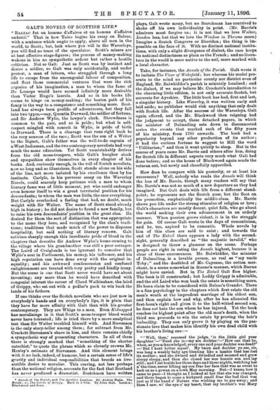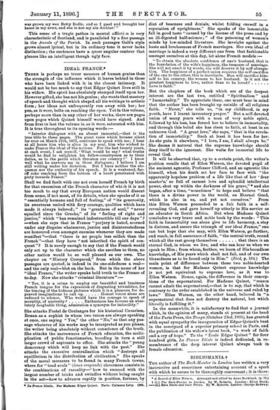GA.LT'S NOVELS OF SCOTTISH LIFE.* " BaLzac fat un homme
d'affaires et un homme d'affaires endette." That is how Taine begins his essay on Balzac, with a sentence which ought to apply, above all men in the world, to Scott ; bat, look where you will in the Waverleys, you will find no trace of the speculator. Scott's misers are at best effective stage-figures ; the process of money-making wakens in him no sympathetic ardour but rather a hostile criticism. Not so Galt. Just as Scott was by instinct and desire a soldier, so Galt was only accidentally, and under protest, a man of letters, who struggled through a long life to escape from the uncongenial labour of composition, and float those commercial ventures that were the rich argosies of his imagination, a man to whom the fame of De Lessepa would have seemed infinitely more desirable than Victor lingo's laurels. And so in his books life seems to hinge on money-making; the beaten path of his fancy is the way to a competence and something more. Scot- land has always been prolific of adventurers, but they fall into two types,—say, Quentin Durward, the soldier of fortune, and Sir Andrew Wylie, the lawyer's clerk. Shrewdness is common to the pair, and so is pride ; but what is self- respect mingled with conceit in Wylie, is pride of birth in Durward. There is a cleavage that runs right back to the very sources of the race; Scott was the son of a Writer to the Signet, Galt's father was the well-to-do captain of a West Indiaman, and the two contemporary novelists had very much the same education. Yet Scott unmistakably derives from the old moss-troopers, while Galt's burgher stock and sympathies show themselves in every chapter of his books. And, curiously enough, in the roll of Scotch novelists, now so long and so illustrious, Scott stands alone on his side of the line, not more isolated by his excellence than by his instincts. Carlyle, in his perverse essay on the Waverley Novels, could scarcely keep patience with a man to whom literary fame was of little moment, yet who could endanger even honour itself to win a great territorial position for his descendants ; to whom the man was little, the race everything. But Carlyle overlooked a feeling that had, no doubt, much weight with Sir Walter. The name of Scott stood already high in history ; he did not desire to found a new family, but to raise his own descendants' position in the great clan. He desired for them the sort of distinction that was appropriate to the name they bore, and recognised by the clan's tradi- tions; traditions that made much of the power to dispense hospitality, but said nothing of literary renown. Galt satirises sharply enough this inordinate pride of blood in the chapters that describe Sir Andrew Wylie's home-coining to the village where his grandmother was still a poor cottager. The Laird of Craiglands is too ignorant to conceive that Wylie's seat in Parliament, his money, his influence, and his high reputation can have done away with the original in- equality ; and his awkward condescension and confused enlightenment are treated with very pretty and kindly irony. But the scene is one that Scott never would have set about inventing; any more than he would have described with congenial interest the career of Claud Walkinshaw, the laird of Grippy, who set out with a pedlar's pack to win back the lands of his fathers.
If one thinks over the Scotch novelista who are just now in everybody's hands and on everybody's lips, it is plain that they have far more affinity with Galt than with his greater contemporary. They are Whigs to a man. Even Kidnapped has moralisings in it that Scott's moss-trooper blood would never have tolerated ; life is tried there by a more analytical test than Sir Walter troubled himself with. And Stevenson is the only story-teller among them; for subtract from Mr. Crockett Stevenson's share in him, and there remains chiefly a sympathetic way of presenting characters. In all of them there is strongly marked that "something of the shorter catechist," to quote the phrase which so cleverly crowns Mr. Henley's estimate of Stevenson. And this element brings with it no lack, indeed, of humour, but a certain sense of life's gravity and individual responsibilities that breeds an irre- sistible desire to moralise. This craving, not less perhaps than the national religion, accounts for the fact that Scotland has never produced a dramatist. Scotchmen have written • Annals of the Parit.h, and The Ayrshire Legatees. Sir Andr.w Wylu. The Entail ;or, Ths Lairds of linpyy. Bach in 2 vols. By John Gilt. London: Blackwood and Sons. .
plays, Galt wrote many, but no Scotchman has contrived to shake off his own individuality in print. (Mr. Barrie's admirers must forgive us ; it is not that we love Walker, London less, but that we love the Window in, Thrums more.) Imagine a Scotch Congreve or Sheridan; the thing is im- possible on the face of it. With no distinct national institu- tions, with only a slight divergence of dialect, the race keeps its national distinctness as plain as the French ; and no liters.- tare in the world is more native to the soil, more marked with a local character.
Take, for instance, the Annals of the Parish. Galt wrote it to imitate The Vicar of Wakefield; but whereas his model pre- sents to the mind no particular county nor district even of England, Mr. Balwhidder's parish is minutely localised ; and the dialect, if we may believe Mr. Crockett's introduction to the charming little edition, is not only accurate Scotch, but accurate for Ayrshire. The little book has had, first and last, a singular history. Like Waverley, it was written early and laid aside; no publisher would risk anything that only dealt with Scotch life. After the success of the Waverleys, Galt again offered, and the Mr. Blackwood then reigning had the judgment to accept, these detached papers, in which the minister of Dalmailing sets down in disconnected series the events that marked each of the fifty years of his ministry, from 1760 onwards. The book had a popularity beyond any other production of its author ;
it had the curious fortune to suggest to Mill. the word "Utilitarian;" and then it went quietly to sleep. But in the course of years came Mr. Barrie and others after him, doing
for Scotch life in different aspects very much what Galt had done before; and so the house of Blackwood again sends the veteran out, but newly and cheerfully apparelled.
How does he compare with his posterity, or at least his successors Well, nobody who reads the Annals will think the less of Mr. Barrie, though many readers will say that Mr. Barrie's was not so much of a new departure as they had imagined. But Galt deals with life from a different stand- point; he represents not the Scotch poor, but the Scot on his promotion, emphatically the middle-class. Mr. Barrie shows you life under the strong stimulus of religion or love ; Galt's characters are mostly decent, quiet folk, who go about the world seeking their own advancement in an orderly manner. When passion grows violent, it is in the struggle for gain. Of course Galt wrote in the days of romanticism, and he, too, aspired to be romantic. Whole novels by him of this class are said to exist ; and towards the end of The Entail there appears a lady with the second- sight, generally described as " the majestic invalid," who
is designed to throw a glamour on the scene. Perhaps people are right in rating the Annals highest, because it is clear of these excrescences. Mr. Balwhidder, the minister of Dalmailing, is a lovable person, as real as "my uncle Toby ; " and the deathbed of Mr. Cayenne, the cotton mer- chant, is a scene somewhat in Sterne's manner, which Sterne might have envied. But in The Entail Galt flies higher.
The book is ill constructed; but Leddy Grippy is admirable, and the old Laird who won back the estate is something more. He has a claim to be considered with Balzac's Grandet. There is a fine psychology in the chapters which first relate the old man's wrath at the imprudent marriage of his eldest son, and then explain how and why, after he has alienated the first-born's right and given it to the half-witted second son,
he does not hate the son whom he has injured. Yet the book reaches its highest point after the old man's death, when the third son proceeds to win the estate by proving the heir's imbecility. They can only prove it by playing on the pas- sionate love that makes him identify his own dead child with his brother's living one:- "' Well, then,' resumed the judge, 'is the little girl your daughter.'—"Deed she is—my vin dochter.'—' How can that be, when, as you acknowledged, every one said your dochter was dead?' —' But I kent better mysel'. My bairn and dochter ye see, sir, was lang a weakly baby aye bleating like a lambie that has lost its mother ; and she dwined and dwindled and moaned and grew sleepy sleepy, and then she closed her wee bonnie een and lay still ; and I sat beside her three days and three nights, watching her a' the time, never lifting my een frae her face that was as sweet to look on as a gowan on a lown May morning. Bat—I kenna how it came to pass—I thought as I looked at her that she was changed, and there began to come a kirkyard smell frae the bed that was just as if the hand o' Nature was wishing me to gae away ; and then I saw, wi' the eye o' my heart, that my brother's wee Mary
was grown my wee Betty Bodle, and so I gaed and brought her hams in my arms, and she is noo my ain dochter.' "
This sense of a tragic pathos in mental affliction is very characteristic of Scotland, and is paralleled by a fine passage in the Annals of the Parish. In such passages Galt's style grows almost lyrical, but in its ordinary tone it never lacks
distinction ; the sentences have a queer angular contour that pleases like an intelligent though ugly face.



































 Previous page
Previous page